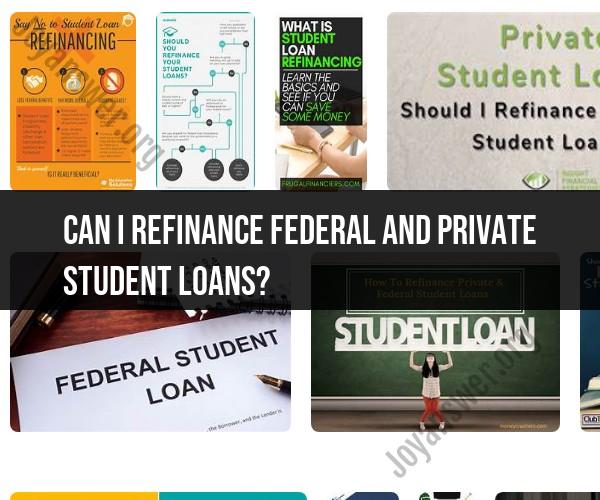Can I refinance federal and private student loans?
Yes, it is possible to refinance both federal and private student loans. However, there are some important considerations and differences between refinancing federal and private student loans:
Refinancing Federal Student Loans:
- When you refinance federal student loans, you are essentially taking out a new private loan to pay off your existing federal loans.
- As a result, you lose access to federal benefits and protections, such as income-driven repayment plans, loan forgiveness programs (like Public Service Loan Forgiveness), and generous deferment and forbearance options.
- Private lenders determine your new interest rate based on your creditworthiness. If you have good credit, you may qualify for a lower interest rate than your federal loans.
- Refinancing can simplify your loan repayment by combining multiple federal loans into one loan with a single monthly payment.
- Before refinancing federal loans, carefully consider whether the loss of federal benefits is worth the potential interest savings. It may not be the best option for everyone.
Refinancing Private Student Loans:
- Refinancing private student loans involves obtaining a new private loan with better terms, such as a lower interest rate or a different repayment schedule.
- This can be a good strategy if you have high-interest private loans and can qualify for a lower interest rate through refinancing.
- Private lenders typically assess your credit history and income when determining eligibility and interest rates.
- Refinancing private loans does not impact your federal loans, so you can keep your federal benefits intact while improving the terms of your private loans.
It's important to carefully review your financial situation and goals before deciding to refinance either federal or private student loans. If you have federal loans and are considering refinancing, make sure you understand the potential trade-offs and loss of federal protections. Additionally, shop around for lenders to find the best rates and terms that suit your needs.
Refinancing Federal and Private Student Loans: Is It Possible?
Yes, it is possible to refinance both federal and private student loans. However, it is important to note that there are some key differences between the two.
Refinancing federal student loans means replacing them with a new private loan. This can be a good option for borrowers who have good credit and can qualify for a lower interest rate. However, it is important to note that refinancing federal student loans means losing access to certain federal benefits, such as income-driven repayment plans and Public Service Loan Forgiveness.
Refinancing private student loans means replacing them with a new private loan from a different lender. This can be a good option for borrowers who want to consolidate their loans or lower their interest rate. However, it is important to compare offers from multiple lenders before refinancing private student loans.
Student Loan Refinancing: Options for Federal and Private Loans
When refinancing federal student loans, borrowers have the option of refinancing all of their federal loans into a single loan or refinancing specific loans. For example, borrowers could refinance their undergraduate loans but keep their graduate loans.
When refinancing private student loans, borrowers have the option of refinancing all of their private loans into a single loan or refinancing specific loans. For example, borrowers could refinance their personal loans but keep their credit card debt.
Consolidating Student Loans: Understanding Your Choices
Consolidating federal student loans means combining them into a single loan. This can make it easier to manage monthly payments, but it does not change the interest rate or terms of the loans.
Consolidating private student loans is typically done through refinancing. This means that borrowers will replace their existing private loans with a new private loan. This can be a good option for borrowers who want to consolidate their loans or lower their interest rate.
Which Option Is Right for You?
The best option for you will depend on your individual circumstances. If you are considering refinancing or consolidating your student loans, it is important to compare offers from multiple lenders and to talk to a financial advisor to make sure you are making the best decision for your needs.
Here are some things to consider when choosing between refinancing and consolidating your student loans:
- Interest rates: Compare the interest rates on refinancing and consolidation offers to see which option will save you the most money.
- Terms: Consider the loan terms, such as the repayment period and prepayment penalties, when choosing between refinancing and consolidation.
- Fees: Some lenders charge fees for refinancing or consolidation. Be sure to compare fees before making a decision.
- Access to federal benefits: If you have federal student loans, keep in mind that refinancing your loans will mean losing access to certain federal benefits, such as income-driven repayment plans and Public Service Loan Forgiveness.
If you are unsure which option is right for you, talk to a financial advisor. They can help you to assess your needs and choose the best option for your situation.












